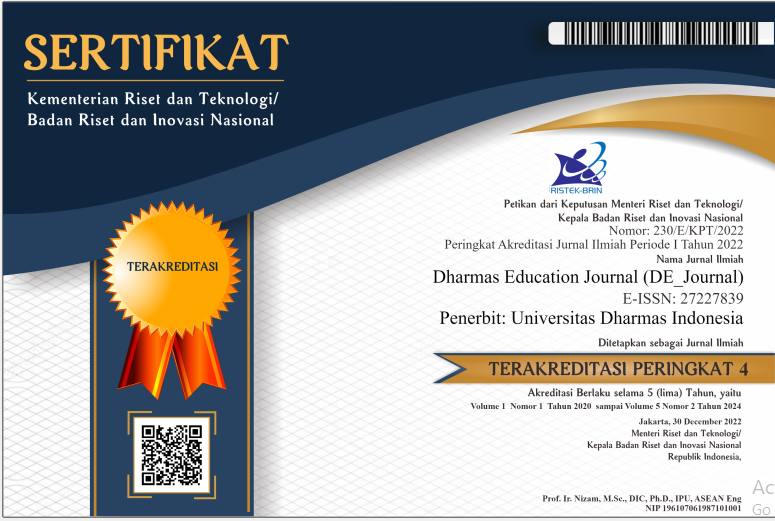Teachers' Strategies In Teaching English Vocabulary At Wca Cruise Ship Hospitality and Culinary Training Center Jakarta
DOI:
https://doi.org/10.56667/de_journal.v6i1.1806Keywords:
Teaching Strategies, English Vocabulary, StudentsAbstract
Emphasizing vocabulary teaching is a very efficient approach to improve students' English comprehension. Vocabulary is the foundation for constructing meaningful and grammatically accurate sentences, emphasizing vocabulary teaching is a very efficient approach to improve students' English comprehension. Students sometimes struggle to comprehend reading materials, express their thoughts, and participate in classroom debates without a strong language foundation. Therefore, vocabulary teaching should be relevant, interesting, and tailored to students' needs and should not be limited to rote learning of word lists. A studyWCA Training Cruise Jakarta Schoollooked at how teachers approach language teaching and how different approaches affect students. The study found that lack of vocabulary is a significant barrier to student learning through interviews, surveys, and document analysis. The teachers used several techniques—including games, translation, media, pantomime, and physical activity—to make learning more engaging and efficient in response. These techniques made the learning experience more enjoyable and helped students remember new terms more easily. The study found that efficient vocabulary teaching requires different, student-centered strategies that encourage
Downloads
References
Alghamdi, A. K. ., & Ahmed, S. Al. (2018). Effective Methods for Teaching English Vocabulary to Saudi Female Students. Journal of Education and Learning (EduLearn). https://doi.org/10.11591/edulearn.v12i1.9125
Bennett, P. (2006). An evaluation of vocabulary teaching in an intensive study programme. Evaluation.
Cravalho, D. A., Jimenez, Z., Shhub, A., & Solis, M. (2020). How Grades 4 to 8 Teachers Can Deliver Intensive Vocabulary and Reading Comprehension Interventions to Students With High-Functioning Autism Spectrum Disorder. Beyond Behavior. https://doi.org/10.1177/1074295620907110
Fauziningrum, E., Sari, M. N., Rahmani, S. F., Riztya, R., Syafruni, S., & Purba, P. M. (2023). Strategies Used by English Teachers in Teaching Vocabulary. Journal on Education. https://doi.org/10.31004/joe.v6i1.2981
Ghalebi, R., Sadighi, F., & Bagheri, M. S. (2021). A study of vocabulary learning strategies among high and low Iranian English vocabulary learners. Cogent Education. https://doi.org/10.1080/2331186X.2020.1834933
Ghonivita, Y., Pahamzah, J., & Ayu Wijayanti, M. (2021). Improving Students’ Listening Skills and Vocabulary Mastery through Contextual Teaching and Learning by Using Online Learning. Journal of English Language Teaching and Cultural Studies. https://doi.org/10.48181/jelts.v4i1.10557
Graham, S., Courtney, L., Marinis, T., & Tonkyn, A. (2017). Early Language Learning: The Impact of Teaching and Teacher Factors. Language Learning. https://doi.org/10.1111/lang.12251
Hamruni. (2018). Strategi Pembelajaran. Insan Madani.
Heidari, K. (2023). Research Methods in Vocabulary Studies [Review]. Teaching English as a or Foreign Language--TESL-EJ. https://doi.org/10.55593/ej.26105r4
Lorenset, C. C., & Tumolo, C. H. S. (2019). Vocabulary Acquisition in English as a Foreign Language: Digital Gameplaying The Sims. Revista Linguagem & Ensino. https://doi.org/10.15210/rle.v22i4.16642
Nacera, A. (2010). Languages learning strategies and the vocabulary size. Procedia - Social and Behavioral Sciences. https://doi.org/10.1016/j.sbspro.2010.03.634
Nation, I. S. P., & Hunston, S. (2018). The goals of vocabulary learning. In Learning Vocabulary in Another Language. https://doi.org/10.1017/cbo9781139858656.003
Sari, H. P., Sutanti, N., & Wahyuningsih, L. T. (2018). DEVELOPING FLASHCARD MEDIA FOR TEACHING VOCABULARY TO THE SEVENTH GRADE STUDENTS OF JUNIOR HIGH SCHOOL (Study Case in the seventh grade students at SMPN 1 Sanankulon). Konstruktivisme: Jurnal Pendidikan & Pembelajaran. https://doi.org/10.30957/konstruk.v10i2.512
Sari, W. P. (2018). Developing Vocabulary Material using Longtion Autorun Application for Hearing Impaired-Eleventh Grade Learners at SLB Negeri Cerme. Journal of English Teaching, Literature, and Applied Linguistics. https://doi.org/10.30587/jetlal.v1i1.326
Sugiono. (2010). Sugiyono,2010:308. Pengembangan Dan Inovasi Kurikulum.
Sugiyono. (2015). Sugiyono, Metode Penelitian dan Pengembangan Pendekatan Kualitatif, Kuantitatif, dan R&D. In Metode Penelitian dan Pengembangan Pendekatan Kualitatif, Kuantitatif, dan R&D.
Sun, H., Yin, B., Amsah, N. F. B. B., & O’Brien, B. A. (2018). Differential effects of internal and external factors in early bilingual vocabulary learning: The case of Singapore. Applied Psycholinguistics. https://doi.org/10.1017/S014271641700039X
Susanto, H. (2021). A STUDY ON STUDENTS’ DIFFICULTIES IN LEARNING VOCABULARY. Journey: Journal of English Language and Pedagogy. https://doi.org/10.33503/journey.v4i2.1413
Tavoosy, Y., & Jelveh, R. (2019). Language teaching strategies and techniques used to support students learning in a language other than their mother tongue. International Journal of Learning and Teaching. https://doi.org/10.18844/ijlt.v11i2.3831
Wu, J., Li, X., Xu, S., Yuan, H., Ding, H., Yang, Y., Li, X., Zhang, J., Tong, Y., Jiang, X., Ghanem, B., & Tao, D. (2024). Towards Open Vocabulary Learning: A Survey. IEEE Transactions on Pattern Analysis and Machine Intelligence. https://doi.org/10.1109/TPAMI.2024.3361862
Downloads
Published
How to Cite
Issue
Section
License
Copyright (c) 2025 Dharmas Education Journal (DE_Journal)

This work is licensed under a Creative Commons Attribution-NonCommercial-NoDerivatives 4.0 International License.
Makalah yang disampaikan diasumsikan tidak mengandung bahan propietary yang tidak dilindungi oleh hak paten















